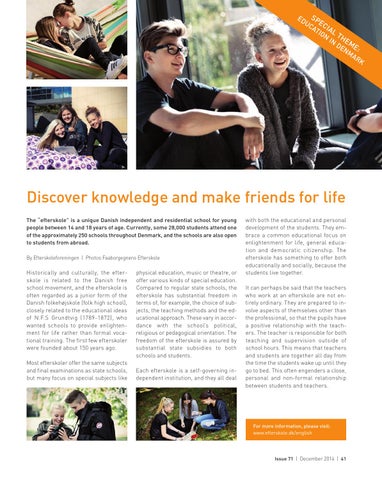2_1_ScanMag_71_Dec_2014_Text_MADS_Scan Magazine 1 29/11/2014 12:12 Page 41
ED SP UC EC AT IA IO L T N IN HEM DE E NM : AR K
Discover knowledge and make friends for life The “efterskole” is a unique Danish independent and residential school for young people between 14 and 18 years of age. Currently, some 28,000 students attend one of the approximately 250 schools throughout Denmark, and the schools are also open to students from abroad. By Efterskoleforeningen | Photos:Faaborgegnens Efterskole
Historically and culturally, the efterskole is related to the Danish free school movement, and the efterskole is often regarded as a junior form of the Danish folkehøjskole (folk high school), closely related to the educational ideas of N.F.S Grundtvig (1789-1872), who wanted schools to provide enlightenment for life rather than formal vocational training. The first few efterskoler were founded about 150 years ago. Most efterskoler offer the same subjects and final examinations as state schools, but many focus on special subjects like
physical education, music or theatre, or offer various kinds of special education. Compared to regular state schools, the efterskole has substantial freedom in terms of, for example, the choice of subjects, the teaching methods and the educational approach. These vary in accordance with the school’s political, religious or pedagogical orientation. The freedom of the efterskole is assured by substantial state subsidies to both schools and students. Each efterskole is a self-governing independent institution, and they all deal
with both the educational and personal development of the students. They embrace a common educational focus on enlightenment for life, general education and democratic citizenship. The efterskole has something to offer both educationally and socially, because the students live together. It can perhaps be said that the teachers who work at an efterskole are not entirely ordinary. They are prepared to involve aspects of themselves other than the professional, so that the pupils have a positive relationship with the teachers. The teacher is responsible for both teaching and supervision outside of school hours. This means that teachers and students are together all day from the time the students wake up until they go to bed. This often engenders a close, personal and non-formal relationship between students and teachers.
For more information, please visit: www.efterskole.dk/english
Issue 71 | December 2014 | 41
